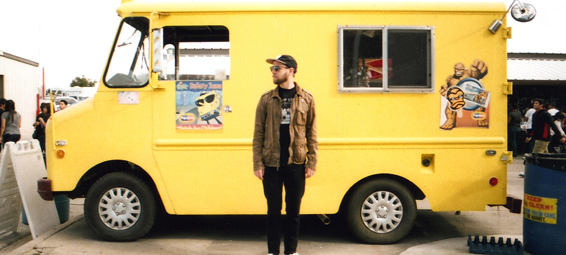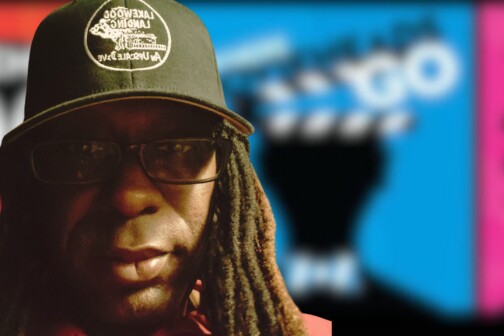Backed into a corner at the Beauty Bar, barricaded by a sea of undulating humanity, DJ Sober is busy at work. Unless you have watched a DJ intently, you don’t realize just how busy that work is. Sober monkeys with the turntable, checks the countdown clock on his laptop, and gauges the speed of his next track. He is air traffic control, guiding a dozen beats into the airspace above the crowd. When he does this well, it is seamless and – dare I admit – entertaining.
For a long time, I have not held this level of respect for the decades-old art of DJ-ing. Frankly, I found it difficult to accept the idea of leaving the house to watch someone play a record. I know this opinion sounds outdated, ignorant, or stubbornly conservative. DJ-ing has long been too prevalent and too respected and too important to hip hop to ignore. Still, I sought out DJ Sober, recently crowned “Dallas’ Best DJ” by the Dallas Observer Music Awards and DJ for Dallas rap group A.Dd+, to give me his version of a DJ manifesto.
DJ Sober, born Will Rhoten, grew up in Fort Worth immersing himself in the culture of skateboarding, hip hop, and graffiti. DJ-ing captivated him from the time he first saw someone spinning records on the early nineties Hip Hop television program “Pump It Up.” Not long after, Rhoten, still in junior high, cornered a house party DJ after his set and grilled him with questions.
“I was that kid. I probably asked him if I could help carry equipment,” Rhoten remembers. The DJ gave Will some pointers on mixing. “I learned how to mix on dance music instead of hip hop. A lot of House DJs pride themselves on really smooth blends and transitions, so I think I took that over into hip hop.”
After calling up bowling alleys and skating rinks, trying to scrounge up his own equipment, Will finally got his own set of turntables around 1993. You have to appreciate the eccentric beauty of that scene. While a healthy percentage of kids his age were still clutching copies of Nevermind and strapping on Stratocasters, Will Rhoten was beaming over his new DJ rig. “They were beat,” Rhoten says of the turntables, which he bought from a defunct club. “They still worked, but they looked like they fell off a truck.”
Rhoten roots a lot of his criteria for excellent DJ-ing in history, particularly the early nineties, when he was learning the craft.
“Back then, a majority of DJs were taste-makers,” says Rhoten. “You had to buy records, and each record is its own animal.”
DJs like Rhoten, who have actually mixed records, learning and working with vinyl’s physical quirks, feel a little like doctors before the days of EKGs and ultrasounds when they could diagnose a heart condition simply by listening through a stethoscope. DJ Sober rattles off a score of other esoteric habits that go into proper DJ-ing: matching beats per minute, hooks, intros of four bars versus eight, scrambling to find the next track during a 14 second sample. Rhoten embraces new technology, but he says those who have a natural ear for music are ahead of the game, regardless of their equipment.
“I think a lot of people, today, buy Serato [a DJ software] from Guitar Center and go straight to a local bar and try to get a weekly,” he says. “You can have all the buttons and effects in the world, but it doesn’t make you a good DJ. There’s an infinite amount of music, so you can never know too much.”
The music is what keeps people like DJ Sober, who owns around 3,000 records, motivated. There are endless tracks out there with which to create a soundtrack for the night. For the best of DJs, that passion for music can be heard in their mixes. In fact, Rhoten has such a deep respect for what he calls “the craft” of DJ-ing that he was initially reluctant to assume the title “DJ.” When he played his first party and organizers asked for name to put on the show fliers, Rhoten simply said “Sober.” It was a graffiti tag name, but it also happened to be true. Despite the reputation of profession, DJ Sober doesn’t drink, which brings with it its own benefits.
“All those shows I went to I left with vinyl, while [my friends] left with a bar tab,” he says.
Rhoten’s break-out in the local scene came after he joined The Party, a DJ collective, in 2006 with DJs Nature and Select. The Party mixed multiple genres and promoted themselves in any way that set them apart from local DJs. Their work ethic and vision paid off, evinced by the lines snaking around the exterior of Zubar, where they held their monthly gig.
“That’s when my DJ skills really took off,” says Rhoten.
The trio of DJs remained active through 2009, when Nature went to Puerto Rico and DJ Select headed off to New York. DJ Sober chose to stay in Dallas, where he had already built a base among fans of The Party.
“It’s like anything,” Rhoten says of fans who began to prefer his style at The Party gigs. “Like He-Man or G.I. Joe or Snake Eyes, you have your guy.”
DJ Sober now DJs as a full-time vocation. And while he has been steeped in the DJ-ing world for over twenty years, he understands someone, like me, who struggles to understand the art. The problem, he thinks, may be that certain people have not heard a DJ that “speaks to them.” To Rhoten, a good DJ is musically astute, willing to bring bold material into the set and able to sonically unite sounds in a way that surprises and excites the crowd. Perhaps most importantly, though, the best DJs are generous, sensitive to what their audience wants.
“There’s maybe a misconception that DJ-ing is all oons-oons or wiki-wiki,” Rhoten says. “[DJ-ing] is creating that good time for other people. You want to seamlessly blend the night from the first hour to the last song.”
Photo: DJ Sober (Credit: Tony Krash)





